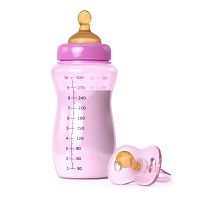Article
Eradicating Infants' Cow's Milk Allergies
Author(s):
Changing the gut bacteria of infants with probiotic formula can reverse cow's milk allergies.

Changing the gut bacteria of infants with probiotic formula can reverse cow’s milk allergies.
According to findings published in The ISME Journal researchers from the University of Chicago used sequence analysis in order to identify bacteria samples found in the stools of healthy infants. The investigators aimed to test the infants with an allergy to cow’s milk after they had been fed the probiotic Lactobacillus rhamnosus GG (LGG) to see if they would increase their tolerance of cow’s milk.
“Mouse model work from our laboratory published last year identified a common class of mucus associated gut bacteria that play a critical role in regulating the access of dietary allergens to the bloodstream,” researcher Cathryn Nagler, PhD explained in a press release. “This suggests a novel mechanism by which commensal bacteria regulate allergic responses to food.”
The researchers had previously demonstrated that LGG could help animal models develop a cow’s milk tolerance at higher rates when compared to the non-treated counterparts. The animals were fed formula, which contained a version of the milk protein casein and supplemented with the LGG bacteria.
The microbiome of the infants with cow’s milk allergies differed from the infants without the allergy, and the authors believe these differences influenced the development of allergies. The LGG treated infants who developed cow’s milk tolerance displayed higher levels of butyrate producing bacteria than the infants treated with LGG who did not develop cow’s milk tolerance.
“The ability to identify bacterial strains that could be used as novel therapeutics for treating food allergies is a fundamental advance,” added study author Jack Gilbert, PhD. “Translating these findings into clinical treatments is our next goal.”
Previous research had estimated that food allergies have increased as much as 20% in the past decade and said that cow’s milk is one of the most common.
Various influences — like widespread antibiotic use, high fat and low fiber diets, reduced exposure to infectious diseases, Caesarean birth, and formula feeding – are likely causes of disturbances in the symbiotic gut bacteria/ human relationship. Genetic predisposition to these microbiome changes may also be in play.
Also present in infants’ guts are viruses, as recently reported by MD Magazine.





